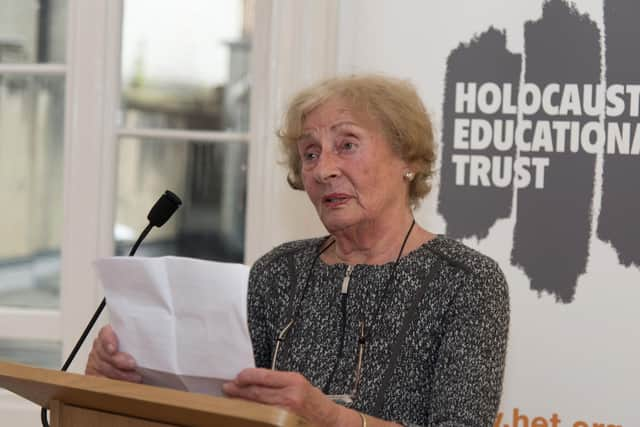Holocaust survivors share moving stories 75 years after liberation of Bergen-Belsen


Speaking on the 75th anniversary of the liberation of the Bergen-Belsen concentration camp in northern Germany, Anita Lasker-Wallfisch said Covid- 19 “might wake people up to have better attitudes towards each other”.
The first camp to be liberated by British troops, the horror of Belsen was on such a scale the BBC initially refused to broadcast the full report by journalist Richard Dimbleby for fear of distressing listeners.
Advertisement
Hide AdAdvertisement
Hide AdThe broadcaster, father of Jonathan and David, said he had “passed through the barrier and found myself in the world of nightmare”.


Describing one prisoner, he said: “She was a living skeleton, impossible to gauge her age for she had practically no hair left, and her face was only a yellow parchment sheet with two holes in it for eyes.”
Footage of the piles of emaciated bodies left outside the camp’s wooden huts soon followed Dimbleby’s report, revealing to the British public for the first time the reality of the Nazis’ “final solution”.
It is estimated 50,000 people died at the camp under Nazi rule, and a further 14,000 of the 60,000 living prisoners found by the British were so frail they perished in the weeks after liberation.
Advertisement
Hide AdAdvertisement
Hide AdDiarist Anne Frank and her sister Margot are among the camp’s most famous victims - believed to have died between February and March 1945 from typhus.
Mrs Lasker-Wallfisch, now 94, was an inmate at Auschwitz before being crammed on a train to Belsen with 3,000 others as the Red Army marched on the notorious extermination camp.
She told the PA media news agency: “People always ask me: ‘Was Belsen better or was it worse than Auschwitz?’ It was just different. Belsen was not a extermination camp.
“In Auschwitz people were murdered in the most sophisticated manner, in Belsen they didn’t need that. In Belsen you just simply perished. That was the difference between the two camps.”
Advertisement
Hide AdAdvertisement
Hide AdShe continued: “Belsen became so overcrowded that they just gave up. The Germans just gave up. They just left us there to die. It was total chaos. The end of the world.”
When asked, with populism on the rise, the world might be in danger of forgetting the lessons of the holocaust, she said: “Of course, we are all worried, but we are worried about something else now.
“We are worried about coronavirus and maybe the end result of this disaster, which is a world disaster, might wake people up to have better attitudes towards each other.”
She added: “Maybe with what is happening now in the world where everyone is affected, maybe people will wake up and realise that people are people - human beings.”
Advertisement
Hide AdAdvertisement
Hide AdFellow survivor Susan Pollack has never forgotten the moment of liberation.
Mrs Pollack, 89, had been sent to work in a munitions factory after undergoing the “Selektion” process at Auschwitz which determined who would be forced into labour and who would be killed immediately.
She arrived at Belsen after being forced on a “death march” with thousands of other prisoners as the Nazis retreated westward over the course of 1945.
Mrs Pollack said: “How could we imagine a death camp of that magnitude? Most of us died from hunger, from disease and from total neglect.
Advertisement
Hide AdAdvertisement
Hide Ad“When the British came and liberated us I was already a corpse, full of lice, but I remember the first time in almost a year the gentleness, kindness.
“Somebody lifted me up and placed me in this little ambulance - how was that possible? By then I was so dehumanised.”
Describing the soldier who helped her, she said: “I remember his touch. I remember his gentleness. I don’t remember what he said because my cognitive perception was gone but that was the first time I think that somehow I felt a spark of hope.”
Mrs Pollack said of the liberators: “Fantastic people. I am grateful forever for what they have done for us survivors - those battle-worn soldiers.”
Advertisement
Hide AdAdvertisement
Hide AdEvents to mark this year’s anniversary were cancelled due to the pandemic, but the Holocaust Educational Trust (HET) and many other charities are working hard to keep the memory of what happened alive.
A message from the Editorial Director, Gillian Parkinson:
Thank you for reading this story on our website.
But I also have an urgent plea to make of you.
In order for us to continue to provide high quality local news on this free-to-read site and in print, please purchase a copy of our newspaper as well.
With the coronavirus lockdown having a major impact on our town centres and many of our valued advertisers - and consequently the advertising that we receive - we are more reliant than ever on you buying a copy when you pop out for your essential shop or subscribing for delivery.
Our journalists are highly trained by the National Council for the Training of Journalists (NCTJ) and our content is independently regulated by IPSO to some of the most rigorous standards anywhere in the world. Our content is universally trusted - as all independent research proves.
Advertisement
Hide AdAdvertisement
Hide AdAs Baroness Barran said in a House of Lords debate this week on the importance of journalists: "Not only are they a trusted source of facts, but they will have a role to play in rallying communities and getting the message across about how we can keep ourselves and our families safe, and protect our NHS. Undoubtedly, they have a critical role."
But being your eyes and ears comes at a price. So we need your support more than ever to buy our newspapers during this crisis. In return we will continue to forensically cover the local news - not only the impact of the virus but all the positive and uplifting news happening in these dark days.
We thank all our readers and advertisers for their understanding and support - and we wish YOU all the best in the coming weeks. Keep safe, and follow the Government advice. Thank you.
HOW TO SUBSCRIBE:
You can subscribe for delivery by contacting us at [email protected] or calling us on 0330 4033004 for details of a participating newsagent near you.